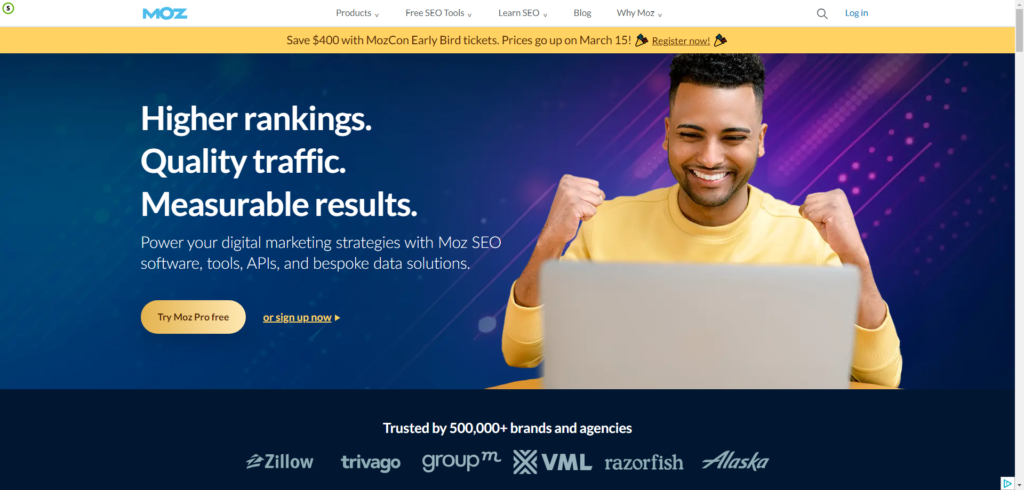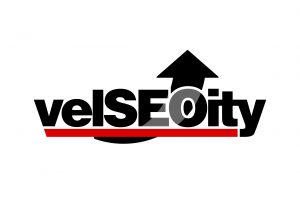Backlinks are critical for SEO success. These external links to your site act as votes of confidence that boost your search rankings. But how can you analyze backlinks to build an optimal profile?
That’s where Moz comes in. In this guide, you’ll learn how Moz enables you to
understand your backlinks better and enhance your SEO strategy
Let’s explore how Moz empowers you to optimize your backlink strategy and elevate your digital presence.

What is Backlink and Why Does It Matter
Backlink is an incoming link from external sites pointing to pages on your website. But why is backlink so crucial for SEO?
Powerful backlinks matter because search engines like Google use them to evaluate the popularity and authority of your content. They serve as votes of trust and confidence in your website.
The more high-quality backlinks you have, especially from reputable sources, the more Google views your content as authoritative and relevant for searchers. This authority and relevance signal leads to better rankings in search results.
Specifically, some key backlink factors that influence your search rankings:
- The number of sites linking to you – More backlinks signal greater authority.
- The quality of linking domains – Links from trusted, popular sites are more valuable.
- Anchor text used – Keyword-rich anchors can improve search rankings.
- Link location on the page – Higher prominence links pass more equity.
- Link velocity – Natural, steady growth looks better than an artificial spike.
Because backlinks are so crucial for SEO, monitoring and building your backlink profile is imperative. That’s where Moz comes in…it provides the tools to analyze your existing links and build better ones over time.
How Moz Helps With Backlink Analysis
We’ve covered why backlinks are so important for SEO. Now let’s explore how Moz specifically enables robust backlink analysis.
Moz offers a powerful backlink analysis tool called Link Explorer – similar to Ahrefs or Majestic SEO. This gives you an information-rich window into the backlink profile of any website.
With Link Explorer, you can:
- See all pages linking to your site and analyze metrics for each backlink. This includes crucial data like:
- Domain Authority – Moz’s score for a site’s authority on a 0-100 scale. Higher is better.
- Spam score – Moz’s rating for manipulative or shady practices. Lower is better.
- Anchor text – The words used for your backlink.
- Link location – Where the backlink appears on the page.
- Compare your backlink portfolio with competitors. Uncover links they have that you’re missing.
- Discover new link building opportunities within your industry.
- Identify toxic links that could hurt your rankings so you can properly disavow them.
- Monitor changes in your backlink profile over time. Spot new links gained or lost.
- Filter and segment your backlinks by source, type, location and more for deeper insights.
Moz Link Explorer provides tremendous visibility into your existing backlink profile and helps inform link building strategy. It enables making data-driven decisions to build a healthier, more authoritative link profile.
How to Use Moz Data to Improve Backlinks
Now that we’ve covered the key backlink metrics Moz provides, how can you use this data to build better backlinks? Here are some tips:
-
Monitor new quality backlinks
Regularly check Moz to identify any recently earned backlinks from brand mentions, content sharing, or other opportunities.
Analyze patterns with your highest quality new backlinks to uncover beneficial strategies that led to those links. For example, determining if guest posts on certain site types or promotions in specific forums tend to generate authoritative backlinks.
-
Disavow toxic links
Utilize Moz’s spam score metric and contextual backlink analysis features to uncover sketchy, manipulative backlinks you should disavow.
Use Google’s disavow tool to request the removal of these harmful links and prevent them from damaging your rankings or diluting your high-quality link profile. Be careful not to over-disavow as that can also negatively impact rankings.
-
Prioritize outreach
When conducting link building outreach such as broken link requests, strategic guest posts, or influencer pitches, make a priority of websites with high Domain Authority scores and relevant industry content related to your niche.
Getting links from these reputable and topically relevant platforms provides more reputational equity or “link juice.”
-
Identify competitors’ sources
Analyze the link profile of relevant competitor websites using Moz’s comparative research capabilities. Take note of which high-authority sites your competition has already managed to earn links from.
Consider reaching out strategically to these same websites to inquire about potential opportunities, while always following each website’s guidelines. Avoid spammy outreach practices.
-
Build a natural link profile
Focus your link building efforts on slowly cultivating a diverse portfolio of quality editorially-given and niche backlinks over time. Follow white hat best practices to obtain these links organically through compelling content and relationship building.
Beware of low-value networks or artificial quick backlinks as these can get your site penalized by search engines.
-
Fix bad links
Regularly evaluate your backlink profile using Moz and identify any unnaturally high anchor text ratios or low-quality links.
Reach out politely to website owners to request removal or correction of those links which could be red flags to search engines. Monitoring and correcting problematic links helps prevent future issues.
While not perfect, Moz backlink data provides invaluable intelligence to inform your link building efforts. Combine it with other signals like Google Search Console data to power your SEO.
Limitations to Keep in Mind
Moz’s backlink data has some limitations to keep in mind such as:
- Index is not comprehensive – Moz’s backlink index, while extensive, does not contain every single backlink that exists pointing to a domain. So it can miss certain links, especially from sites Moz’s web crawlers may not encounter. Thus it should not be viewed as an absolute complete set of backlinks.
- Accuracy depends on crawling – The accuracy of Moz’s backlink data depends on the scope and frequency of their web crawling efforts. Hard-to-reach or off-the-beaten-path pages that Moz’s bots don’t crawl regularly can have outdated or incomplete backlink metrics.
- Data can become outdated – If Moz fails to recrawl and re-index certain sites consistently, the backlink details in its database can become outdated. So if Moz hasn’t revisited a site for a while, some links could be stale or missing.
- Context is lacking – Purely quantitative metrics don’t tell the whole story when evaluating links. The specific language and context around each backlink can provide more qualitative signals into its value, but this context is missing from Moz.
- Multiple views needed – Given the various crawling and accuracy limitations listed above, Moz backlink data works best when viewed as supplementary and compared against other link indexes to form the full picture. Cross-reference Moz with other tools before making conclusions or changes.
So Moz should be viewed as a useful supplementary backlink tool, but not the absolute authority. Compare its data with other sources for the full picture.
Other Valuable SEO Tools Moz Offers
In addition to its popular Link Explorer backlink analysis feature, Moz also provides a robust suite of other valuable SEO and marketing tools to support multiple needs. While Link Explorer is extremely useful for evaluating and improving your website’s backlink profile, Moz can empower other search optimization activities as well.
Other popular Moz tool capabilities include:
- Keyword Research – Discover and track search terms that align with your business to optimize content and pages around high-potential keywords your audience is searching for. Identify terms with solid volume that are relevant to improve SEO rankings for strategic keywords over time.
- Rank Tracking – Monitor the current search engine rankings of your website for target keywords. Track changes in rankings over time to measure SEO success and identify new opportunities to reach higher positions. Includes location-based rank tracking.
- Site Crawl – Crawl your overall website to identify SEO issues like broken links, duplicate content, accessibility problems and more so that technical problems can be fixed. Helps monitor site health.
- Local Tools – Manage and improve local SEO signals like business name, address and phone number consistency to strengthen the odds of ranking well in Google’s local pack. Ensure your locations show correctly in local results.
Additional capabilities like QA tools, reporting, API access, and competitive research allow Moz to support many aspects of SEO campaigns and digital marketing efforts. An all-in-one platform.
So while backlink evaluation is a key use case, Moz also empowers SEO practitioners and marketers with other data-driven functions to measure and boost their organic search performance. An extensive toolset for search marketers.
Moz: Your Backlink Clarity Catalyst
Backlinks remain among the highest correlating ranking factors. Thus backlink growth strategy demands continual refinement through intelligence.
Moz provides visibility -spotlighting untapped opportunities while revealing risky build-ups needing remedy. Optimize linkage both old and new.
Though not the sole analysis source, Moz fuels actionability. Its comparative windows help transform scattered data points into an actionable roadmap for advancement.
Sharpen, strengthen and diversify your backlink backbone for heightened discoverability. Let Moz analytical sight expose possibilities for crafting ever-ascending pathways.
The information gleaned serves as a catalyst; sparking potential channels to relay your authority taller. Build upon a healthy foundation.
Frequently Asked Questions
What are backlinks?
Incoming links from other sites pointing to your webpages.
Why do backlinks matter for rankings?
Search engines interpret backlinks as signals of content quality, popularity and site authority.
What backlink factors influence search positions?
Number of links, quality of referral domains, anchor texts used, link placement prominence on pages, and natural link velocity growth patterns over time.
What backlink insights does Moz provide?
Data on all links to your site, metrics assessing the value of each link, comparisons to competitors’ profiles, and link opportunity identification.
How to use Moz data for better backlinks?
Monitor new quality links gained, disavow risky links, prioritize outreach to reputable websites, examine competitors’ link sources to emulate, and correct unnatural link profile ratios.
What are Moz’s backlink data limitations?
Incomplete index coverage, reliance on internal crawling, potential outdated metrics if not recrawled regularly, lack of qualitative context.
What makes a quality backlink portfolio?
Editorial links from relevant industry websites built slowly over time, with a diverse mix of domains and natural growth velocity.
How often do you check Moz for the latest backlink data?
Ideally once per month to stay updated on the latest links earned, newly risky links to address, and monitor competitor link-building trends.
What are some common editorial link types?
Guest posts, broken link-building outreach, relevant resource pages, and sponsored comments on industry blogs.
Should link building focus on quantity or quality?
Quality over quantity – a few authoritative niche links often yield better results than a greater volume of peripheral or manipulative links.




